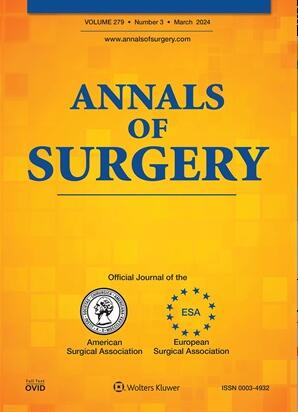痴呆症患者和护理人员在手术决策方面的经验。
IF 6.4
1区 医学
Q1 SURGERY
引用次数: 0
摘要
目的探讨痴呆(PLWD)患者手术决策的患者和护理人员经验。背景:plwd面临较高的手术预后不良风险。对于PLWD,手术决策通常是与护理人员(支持PLWD的家人或亲密的其他人)合作做出的,但关于PLWD和护理人员手术决策经验的研究有限。方法我们对在过去两年内面临手术决定的全国招募的PLWD (n=11)和护理人员(n=36)进行了深入访谈。访谈探讨了手术决策经验。使用反身性主题分析,我们对转录的访谈数据进行编码,并开发与决策优先级、策略、经验和满意度相关的主题。结果确定了以下主题:(1)老年痴呆症患者和护理人员优先考虑生活质量结果;(2)他们难以预测老年痴呆症治疗方案的收益和风险;(3)当老年痴呆症患者无法参与决策时,护理人员感到做出“正确”决策的负担沉重;(4)决策后悔源于决策与护理人员认为老年痴呆症患者希望的结果缺乏一致性。结论:splwd和护理人员做出了令人担忧的手术决定,并在手术和非手术选择的潜在认知和功能权衡之间寻求“正确”的平衡。研究结果强调了对PLWD以及代表PLWD面临决策的护理人员进行有针对性的决策支持的必要性。结果提示了改善手术决策质量和结果的潜在机制。本文章由计算机程序翻译,如有差异,请以英文原文为准。
Patient and Caregiver Experiences with Surgical Decision-Making in the Context of Dementia.
OBJECTIVE
To explore patient and caregiver experiences of surgical decision-making for patients living with dementia (PLWD).
SUMMARY BACKGROUND DATA
PLWD face heightened risks of poor surgical outcomes. For PLWD, surgical decisions are often made in collaboration with caregivers (family or close others who support the PLWD), yet there is limited research examining PLWD and caregiver experiences of surgical decision-making.
METHODS
We conducted in-depth interviews with nationally recruited PLWD (n=11) and caregivers (n=36) facing a surgical decision within the past two years. Interviews explored surgical decision-making experiences. Using reflexive thematic analysis, we coded the transcribed interview data and developed themes related to decision-making priorities, strategies, experiences, and satisfaction.
RESULTS
The following themes were identified: (1) PLWD and caregivers prioritized quality-of-life outcomes, (2) They struggled to anticipate benefits and risks of treatment options for the PLWD, (3) Caregivers felt a heavy burden to make the "right" decision when PLWD were unable to participate in decision-making, and (4) Decisional regret stemmed from a lack of alignment between the decision and what the caregiver felt the PLWD would have wanted.
CONCLUSIONS
PLWD and caregivers navigated fraught surgical decisions and sought the 'right' balance between potential cognitive and functional tradeoffs of surgical and non-surgical options. Findings highlight the need for targeted decisional support for PLWD as well as caregivers who face decision-making on behalf of PLWD. Results inform potential mechanisms for improving surgical decision-making quality and outcomes.
求助全文
通过发布文献求助,成功后即可免费获取论文全文。
去求助
来源期刊

Annals of surgery
医学-外科
CiteScore
14.40
自引率
4.40%
发文量
687
审稿时长
4 months
期刊介绍:
The Annals of Surgery is a renowned surgery journal, recognized globally for its extensive scholarly references. It serves as a valuable resource for the international medical community by disseminating knowledge regarding important developments in surgical science and practice. Surgeons regularly turn to the Annals of Surgery to stay updated on innovative practices and techniques. The journal also offers special editorial features such as "Advances in Surgical Technique," offering timely coverage of ongoing clinical issues. Additionally, the journal publishes monthly review articles that address the latest concerns in surgical practice.
 求助内容:
求助内容: 应助结果提醒方式:
应助结果提醒方式:


